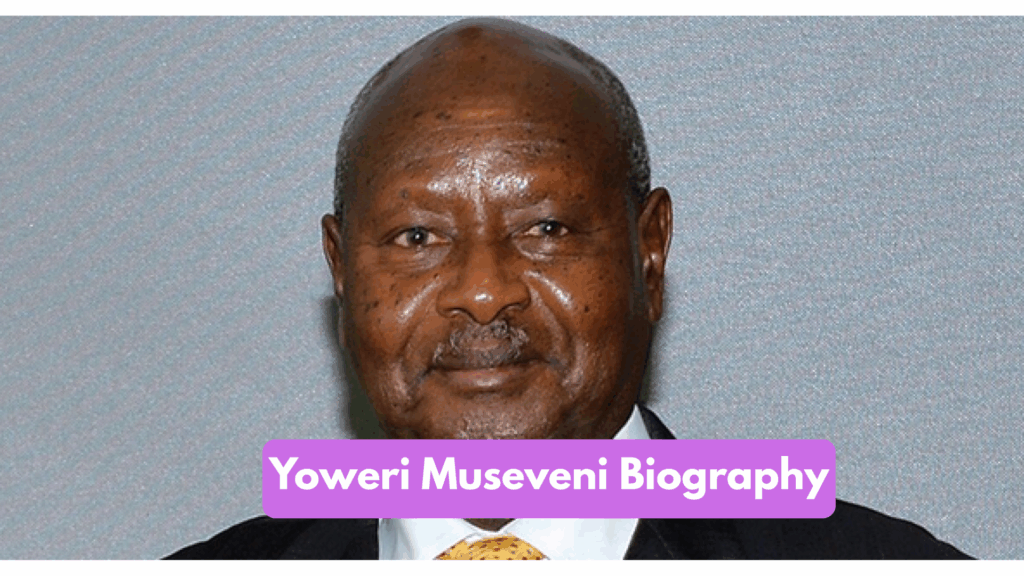Yoweri Museveni Biography: Wife, Age, Net Worth, Education, Children, Nationality

Yoweri Kaguta Museveni has been one of Africa’s most influential and controversial leaders for nearly four decades.
Born on 15 September 1944, Museveni rose from rural beginnings and student activism to lead a guerrilla insurgency that toppled Uganda’s government in 1986.
Since then he has served as Uganda’s ninth president, overseeing significant changes in the country’s security, economy, and political institutions — while also drawing persistent criticism over democratic backsliding and human rights concerns.
Early life and education
Museveni was born into a pastoralist family in the Ankole region of western Uganda. His childhood experiences on a cattle-owning farm exposed him to rural realities and local government structures. He attended primary and secondary schools in Uganda and later studied at the University of Dar es Salaam and the University of Nairobi, where he engaged with leftist and Pan-African ideas that shaped his political outlook. During his student years he became involved in political activism and built networks with future East African leaders.
Political awakening and early activism
In the 1970s and early 1980s Uganda underwent violent upheavals under dictatorships and contested elections. Museveni first entered national politics as part of opposition movements, and after losing in the disputed 1980 elections he organized what became the National Resistance Army (NRA). His guerrilla campaign — commonly known as the Ugandan Bush War (1981–1986) — fought government forces and eventually took control of Kampala, paving the way for Museveni’s ascent to the presidency. Observers estimate the conflict caused many casualties and reshaped Uganda’s political institutions.
Rise to the presidency (1986) and consolidation
After seizing power in January 1986, Museveni established the National Resistance Movement (NRM) as the dominant political force. He initially portrayed his rule as a corrective to past abuses, promising stability, economic recovery, and modernization. Early years of his administration focused on rebuilding institutions, restoring security, and courting international donors. Museveni’s government also promoted programs in health and education that later showed measurable gains.
Key policies and achievements
- Economic reforms and relative stability in the 1990s attracted donor assistance and investment, contributing to GDP growth.
- Public-health initiatives and widespread campaigns helped reduce HIV/AIDS prevalence after the 1990s peak.
- Infrastructure and regional diplomacy: his government invested in roads and regional security efforts, positioning Uganda as an important East African player.
Controversies and criticisms
While Museveni is credited with bringing stability to a chaotic post-independence period, his presidency has also attracted sustained criticism:
- Constitutional changes and power consolidation: Over time, constitutional amendments removed presidential age and term limits, allowing Museveni to extend his rule beyond the originally expected timeframe. Critics argue these changes undermined democratic norms.
- Human rights and political space: Opposition leaders, activists, and international watchdogs have accused the government of shrinking democratic space through arrests, restrictions on media and civil society, and the use of security forces against opponents. Recent legislation and enforcement moves have drawn particular scrutiny.
- Treatment of minorities and civil liberties: Policies and rhetoric targeting LGBTQ+ people and other marginalized groups have led to international condemnation and concerns about mounting abuses.
Recent years and electoral politics
Museveni has successfully contested multiple elections and secured successive mandates. Each election cycle has renewed debates about fairness, electoral administration, and the ability of opposition figures to campaign freely. As of 2025, Museveni remains a dominant figure in Uganda’s politics, guiding both domestic policy and Uganda’s role in regional affairs. International and domestic observers continue to monitor legal, constitutional, and institutional changes affecting future transitions of power.
Personal life and public image
Museveni’s public image blends the austere military commander with the approachable rural leader — his hat and plain shirts have become symbolic. He is married and has a large family. Over decades in power he has cultivated a persona as a pragmatic African statesman, while opponents paint him as a leader who has overstayed his welcome. The duality of his image reflects Uganda’s broader political tensions: development and stability on one hand, democratic erosion on the other.
Legacy — how history may remember Museveni
Assessing Museveni’s legacy is complex. Supporters point to decades of relative peace, macroeconomic improvements, and health gains. Critics emphasize constitutional manipulation, restricted civic space, and human rights concerns. Ultimately, Museveni’s place in Uganda’s history will be judged by whether the institutions he shaped can support a credible democratic transition and protect civil liberties for future generations.
Frequently Asked Questions (FAQs)
When was Yoweri Museveni born?
Yoweri Kaguta Museveni was born on 15 September 1944.
When did Museveni become president of Uganda?
Museveni assumed power after the NRA seized Kampala; his official presidency began in January 1986.
What is the National Resistance Movement (NRM)?
The NRM is Museveni’s political organization and movement that evolved from the guerrilla NRA and has been the ruling party since 1986.
Has Museveni changed Uganda’s constitution?
Yes. During his tenure, the constitution has been amended, including removal of presidential age and term limits — a controversial development critics say entrenches long-term rule.
What are the main criticisms of Museveni’s rule?
Major criticisms include restrictions on political opposition and media, alleged human rights abuses, and constitutional changes favoring prolonged incumbency. Recent laws enabling certain military jurisdiction over civilians and laws targeting LGBTQ+ people have drawn international concern.
Conclusion
Yoweri Museveni’s life story is a study in contrasts: a guerrilla leader who brought relative stability and certain development gains to Uganda, yet a long-standing president whose methods and measures have raised deep democratic and human rights concerns. Understanding Museveni’s biography requires balancing the pragmatic gains of peace and public-health progress with the enduring questions about governance, rule of law, and political freedoms that will ultimately define his legacy.


